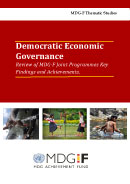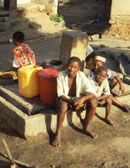

Democratic Economic Governance
 Ensure Environmental Sustainability
Ensure Environmental Sustainability
Good governance is an influential factor in achieving the MDGs.
In Bosnia & Herzegovina, the MDG-F directed US$1.25 million of investments in small infrastructure projects to increase water supply coverage. In Honduras, we leveraged nearly US$4 million from the Central American Economic Integration Bank for rural infrastructure, bringing water and sanitation to nearly 35,000 people. And in the Philippines, the government has agreed to provide $230,000 to develop water supply systems in each of the 36 municipalities served by MDG-F initiatives.
These efforts contribute directly to meeting the MDG target of halving the proportion of people without sustainable access to safe drinking water by 2015, one of the targets of MDG 7.
RESULTS OF OUR WORK:
- 440,000 citizens gained access to safe affordable drinking water.
- 31.7 million people improved their lives through 41 new laws, 78 policies and 157 plans to boost water and sanitation services.
- 669 community organizations and 665 local providers were strengthened or created to promote community empowerment and participation in water management.
Click here for a complete report of the indicators and results achieved by the MDG-F’s 11 joint programmes on Democratic Economic Governance.
Success Stories

Analysis of key findings and achievements
This report captures the main achievements and experiences of the MDG-F’s programmes in this thematic window and presents their impact on the lives of communities across five regions. Prepared by an independent expert, the study is based on extensive desk reviews, interviews with selected joint programmes, and a thorough analysis and synthesis of inputs and contributions.
| Download Summary | Download Full Report |

Democratic Economic Governance Database
Experiences and lessons learned from the MDG-Fund's 11 Joint Programmes have been gathered in a database to facilitate the sharing of knowledge about how to strengthen democratic economic governance in the water and sanitation sector. Among the areas explored are sector coordination, public participation, community management and model contracts.
|
Joint Programme Title
Country
MDG-F Programme Area
|
